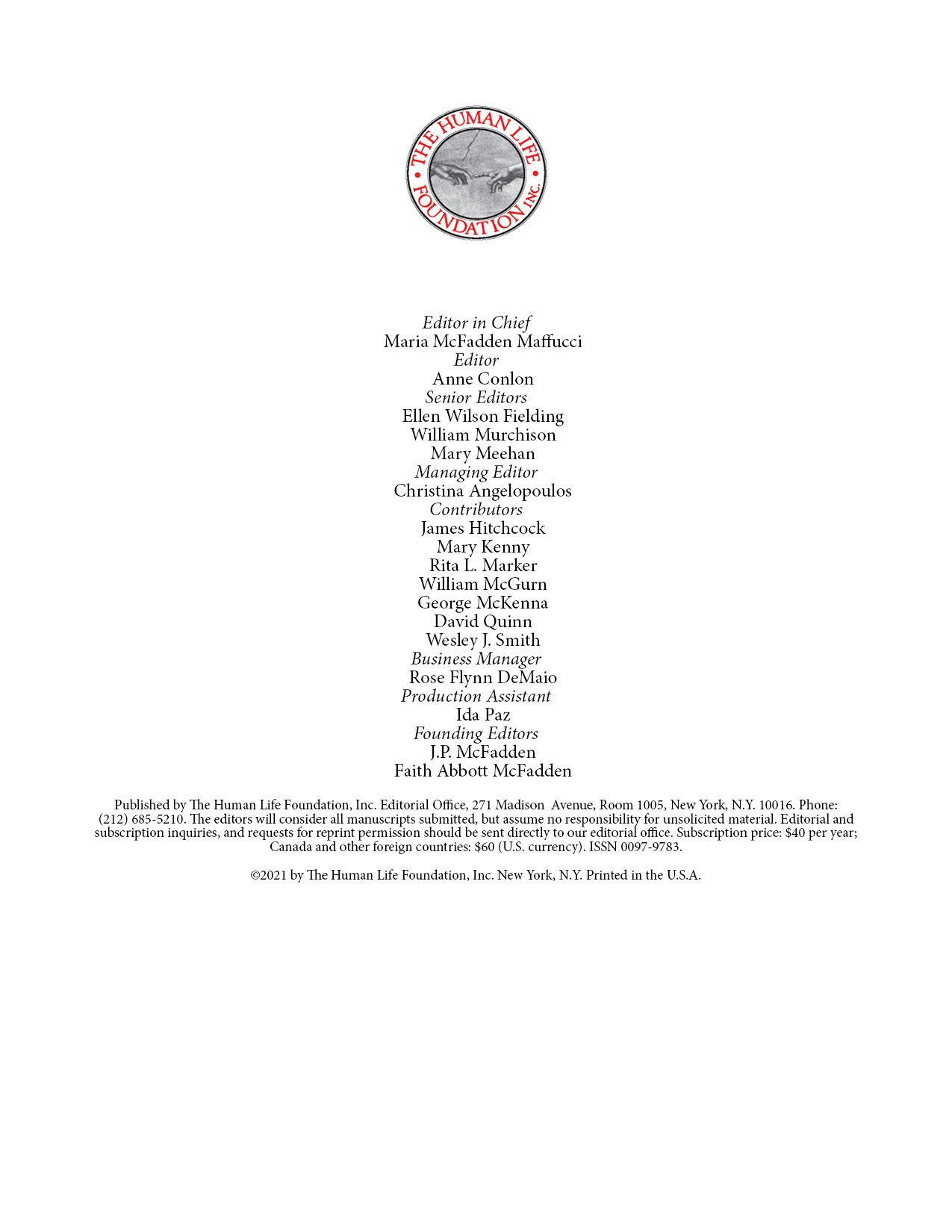|
|
 - About this issue…. . . Our fervent New Year’s hopes for better days ahead came crashing down just six days later, as we watched with horror the violent scenes unfolding in Washington DC. As senior editor William Murchison puts it in the Coda to “How to Assess the 2020 Election” (a prophetic article about mixing politics and religion, p.5): “One can hardly get already aching arms around the whole crazy mess.” January 6 would also have been the 60th birthday of my late my brother Robert Arthur McFadden, who died from cancer at the tender age of 34. On page 64, I share my thoughts about this year’s Epiphany day and what Robert might have made of it all.In another bit of unprecedented news, this year’s March for Life was almost completely virtual—50 pro-life leaders representing millions of pro-life Americans processed solemnly to the now fenced-in Supreme Court. We commend the March for Life Education and Defense Fund for meeting the challenges of the times and putting together an impressive virtual event, and especially for honoring Supreme Knight Carl A. Anderson of the Knights of Columbus with the Pro-Life Legacy Award at the Virtual Rose Dinner Gala (see p. 96).Winter has already brought the loss of two great defenders of life (see pp. 73-74). Joseph Scheidler died on January 18 at 93; the “godfather of the pro-life movement” is described by Stephen Vincent as the “Supreme Victor” in the three-decade-long court case NOW v. Scheidler (from our archives. p. 75). John Patrick Mackey, who died January 1 at 73, was an early champion of the unborn in Washington DC, serving as Special Counsel for the Ad Hoc Committee in Defense of Life, a lobbying organization created in 1974 by the Review’s founding editor J. P. McFadden.John Grondelski reviews Broken Bonds: Surrogate Mothers Speak Out, edited by Jennifer Lahl and Melinda Tankard Reist (both of whom are Review contributors) and Renate Klein on p. 57. Tankard Reist is co-founder and Campaign Director of the grassroots movement Collective Shout, which advocates against the objectification of women and the sexualization of girls (www.collectiveshout.org).Our thanks start with The National Association of Scholars for permission to reprint Maureen Mullarkey’s article “John Leo: Principle and Prescience,” which first appeared in Academic Questions. For our appendices we thank, in order: the National Catholic Register for “How Aborted Children Are Used in Medical Research in 2020” by Stacy Transacos;”; David Mills and The Stream for “How Abortion Disappears Children: A Lesson from Argentina”; National Review for “Where the Disabled Have a Right to Be Born” by Madeleine Kearns; First Things for Matthew Hennessey’s “Magdalena”; and finally, His Eminence Timothy Cardinal Dolan for his permission to reprint “Why We Catholics Are So ‘Hung Up’ on Abortion.” And we thank, as always, cartoonist Nick Downes for his needed reminders to chuckle now and then.I close here with words from Cardinal Dolan that pinpoint both our challenges going forward and the moral incoherency on life issues of President Joseph Biden’s administration:
“How can we sustain a culture that recoils at violence, exclusion, suicide, racism, injustice, and callousness toward those in need, if we applaud, allow, pay for, and promote the destruction of the most helpless, the baby in the womb?”
Maria McFadden Maffucci
Editor in Chief
-
Recently while listening to a Jordan Peterson podcast I heard the bestselling author say this: “Those who formulate the best arguments win. They win everything.” Well then, I thought, why haven’t we won? Why hasn’t the movement for life turned back the movement for death? This journal’s archive bulges with best arguments—some formulated by our senior editor William Murchison, who recently retired his syndicated column after fifty years of newspapering. In “How to Assess the 2020 Election,” Murchison, like me, asks why Roe v. Wade remains “legally, constitutionally, in place after nearly a half century.” His answer? “Hearts and minds have been changed. Just not enough of them.” And the way to change enough of them, he insists, isn’t through elections. “What the society at large believes, and believes strongly is what the political class will attend to. Can’t be otherwise in a democracy.” What “made possible Roe v. Wade,” Murchison argues, “was the withdrawal of hearts and minds from affection for and attachment to the principle of life. It wasn’t the politics,” which at the time, he recalls, “was light and loose.” There was resistance to the “chance” the Supremes took with Roe, to be sure, “just not enough to procure an overturn at the political-judicial level.” And there still isn’t.
Read Full Intro
|
